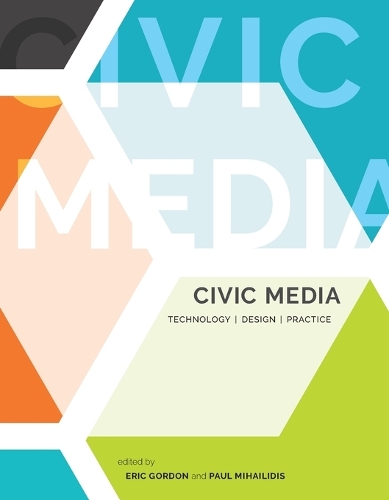
Civic Media: Technology, Design, Practice
(Paperback)
Publishing Details
Civic Media: Technology, Design, Practice
By (Author) Eric Gordon
Edited by Paul Mihailidis
MIT Press Ltd
MIT Press
7th June 2022
United States
Classifications
General
Non Fiction
Political activism / Political engagement
302.23
Physical Properties
Paperback
664
Width 178mm, Height 229mm
369g
Description
Examinations of civic engagement in digital culture-the technologies, designs, and practices that support connection through common purpose in civic, political, and social life. Countless people around the world harness the affordances of digital media to enable democratic participation, coordinate disaster relief, campaign for policy change, and strengthen local advocacy groups. The world watched as activists used social media to organize protests during the Arab Spring, Occupy Wall Street, and Hong Kong's Umbrella Revolution. Many governmental and community organizations changed their mission and function as they adopted new digital tools and practices. This book examines the use of "civic media"-the technologies, designs, and practices that support connection through common purpose in civic, political, and social life. Scholars from a range of disciplines and practitioners from a variety of organizations offer analyses and case studies that explore the theory and practice of civic media. The contributors set out the conceptual context for the intersection of civic and media; examine the pressure to innovate and the sustainability of innovation; explore play as a template for resistance; look at civic education; discuss media-enabled activism in communities; and consider methods and funding for civic media research. The case studies that round out each section range from a "debt resistance" movement to government service delivery ratings to the "It Gets Better" campaign aimed at combating suicide among lesbian, gay, bisexual, transgender, and queer youth. The book offers a valuable interdisciplinary dialogue on the challenges and opportunities of the increasingly influential space of civic media.
Author Bio
Eric Gordon is Director of the Engagement Lab and Associate Professor of Visual and Media Arts at Emerson College. He is the coauthor of Net Locality. Paul Mihailidis is Principle Investigator and Co-Director of the Engagement Lab and Associate Professor in the School of Communication at Emerson College. He is the author of Media Literacy and the Emerging Citizen. W. Lance Bennett is Ruddick C. Lawrence Professor of Communication and Professor of Political Science at the University of Washington. Eric Gordon is Director of the Engagement Lab and Associate Professor of Visual and Media Arts at Emerson College. He is the coauthor of Net Locality. B. Coleman is Assistant Professor of Writing and New Media in MIT's Program in Writing and Humanistic Studies and Comparative Media Studies. She is Faculty Director of the C3 Game Culture and Mobile Media initiative. Henry Jenkins is Provost's Professor of Communication, Journalism and Cinematic Arts at the Annenberg School for Communication, University of Southern California. He is the coeditor of From Barbie to Mortal Kombat- Gender and Computer Games (MIT Press, 1998). Paul Mihailidis is Principle Investigator and Co-Director of the Engagement Lab and Associate Professor in the School of Communication at Emerson College. He is the author of Media Literacy and the Emerging Citizen. Elisabeth Soep is Research Director and Senior Producer at Youth Radio, a national youth-driven production company in Oakland, California. She is the coauthor of Drop That Knowledge- Youth Radio Stories and a member of the Youth and Participatory Politics Research Network, a group of scholars whose work deeply informs this report. Katie Day Good is Assistant Professor in the Department of Media, Journalism, and Film at Miami University in Oxford, Ohio. Joseph Kahne is Professor of Education, Abbie Valley Chair, Dean of the School of Education, and Research Director of the Civic Engagement Research Group at Mills College. Marcus Foth, Founder and Director of the Urban Informatics Research Lab, is Professor in Interactive and Visual Design, School of Design, Creative Industries Faculty, at Queensland University of Technology, Brisbane, Australia. Carl DiSalvo is Assistant Professor of Digital Media in the School of Literature, Communication, and Culture at Georgia Institute of Technology.
